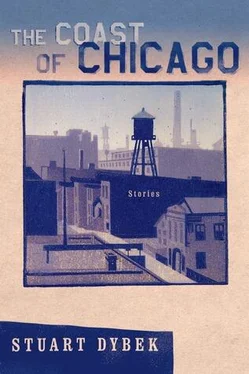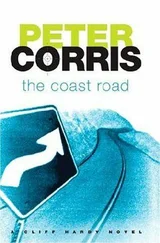Stuart Dybek - The Coast of Chicago - Stories
Здесь есть возможность читать онлайн «Stuart Dybek - The Coast of Chicago - Stories» весь текст электронной книги совершенно бесплатно (целиком полную версию без сокращений). В некоторых случаях можно слушать аудио, скачать через торрент в формате fb2 и присутствует краткое содержание. Год выпуска: 2004, Издательство: Picador, Жанр: Современная проза, на английском языке. Описание произведения, (предисловие) а так же отзывы посетителей доступны на портале библиотеки ЛибКат.
- Название:The Coast of Chicago: Stories
- Автор:
- Издательство:Picador
- Жанр:
- Год:2004
- ISBN:нет данных
- Рейтинг книги:5 / 5. Голосов: 1
-
Избранное:Добавить в избранное
- Отзывы:
-
Ваша оценка:
- 100
- 1
- 2
- 3
- 4
- 5
The Coast of Chicago: Stories: краткое содержание, описание и аннотация
Предлагаем к чтению аннотацию, описание, краткое содержание или предисловие (зависит от того, что написал сам автор книги «The Coast of Chicago: Stories»). Если вы не нашли необходимую информацию о книге — напишите в комментариях, мы постараемся отыскать её.
is a masterpiece from one of America’s most highly regarded writers.
The Coast of Chicago: Stories — читать онлайн бесплатно полную книгу (весь текст) целиком
Ниже представлен текст книги, разбитый по страницам. Система сохранения места последней прочитанной страницы, позволяет с удобством читать онлайн бесплатно книгу «The Coast of Chicago: Stories», без необходимости каждый раз заново искать на чём Вы остановились. Поставьте закладку, и сможете в любой момент перейти на страницу, на которой закончили чтение.
Интервал:
Закладка:
Her father had found her half-naked body floating facedown among water lilies, her blond hair fanning at the marshy edge of the overgrown duck pond people still referred to as the Douglas Park Lagoon.
That’s how Eddie Kapusta had heard it.
Douglas Park was a black park now, the lagoon curdled in milky green scum as if it had soured, and Kapusta didn’t doubt that were he to go there they’d find his body floating in the lily pads too. But sometimes in winter, riding by on the California Avenue bus, the park flocked white, deserted, and the lagoon frozen over, Eddie could almost picture what it had been back then: swans gliding around the small, wooded island at the center, and rowboats plying into sunlight from the gaping stone tunnels of the haunted-looking boathouse.
The girl had gone rowing with a couple of guys — some said they were sailors, neighborhood kids going off to the war — nobody ever said who exactly or why she went with them, as if it didn’t matter. They rowed her around to the blind side of the little island. Nobody knew what happened there either. It was necessary for each person to imagine it for himself.
They were only joking at first was how Kapusta imagined it, laughing at her broken English, telling her to be friendly or swim home. One of them stroked her hair, gently undid her bun, and as her hair fell cascading over her shoulders surprising them all, the other reached too suddenly for the buttons on her blouse; she tore away so hard the boat rocked violently, her slip and bra split, breasts sprung loose, she dove.
Even the suddenness was slow motion the way Kapusta imagined it. But once they were in the water the rest went through his mind in a flash — the boat capsizing, the sailors thrashing for the little island, and the girl struggling alone in that sepia water too warm from summer, just barely deep enough for bullheads, with a mud bottom kids said was quicksand exploding into darkness with each kick. He didn’t want to wonder what she remembered as she held her last breath underwater. His mind raced over that to her father wading out into cattails, scooping her half-naked and still limp from the resisting water lilies, and running with her in his arms across the park crying in Polish or Slovak or Bohemian, whatever they were, and then riding with her on the streetcar he wouldn’t let stop until it reached the icehouse he owned, where crazy with grief he sealed her in ice.
“I believe it up to the part about the streetcar,” Manny Santora said that summer when they told each other such stories, talking often about things Manny called weirdness while pitching quarters in front of Buddy’s Bar. “I don’t believe he hijacked no streetcar, man.”
“What you think, man, he called a cab?” Pancho, Manny’s older brother, asked, winking at Eddie as if he’d scored.
Every time they talked like this Manny and Pancho argued. Pancho believed in everything — ghosts, astrology, legends. His nickname was Padrecito, which went back to his days as an altar boy when he would dress up as a priest and hold mass in the backyard with hosts punched with bottle caps from stale tortillas and real wine he’d collected from bottles the winos had left on door stoops. Eddie’s nickname was Eduardo, though the only person who called him that was Manny, who had made it up. Manny wasn’t the kind of guy to have a nickname — he was Manny or Santora.
Pancho believed if you played certain rock songs backward you’d hear secret messages from the devil. He believed in devils and angels. He still believed he had a guardian angel. It was something like being lucky, like making the sign of the cross before you stepped into the batter’s box. “It’s why I don’t get caught even when I’m caught,” he’d say when the cops would catch him dealing and not take him in. Pancho believed in saints. For a while he had even belonged to a gang called the Saints. They’d tried to recruit Manny too, who, though younger, was tougher than Pancho, but Manny had no use for gangs. “I already belong to the Loners,” he said.
Pancho believed in the girl in ice. In sixth grade, Sister Joachim, the ancient nun in charge of the altar boys, had told him the girl should be canonized and that she’d secretly written to the pope informing him that already there had been miracles and cures. “All the martyrs didn’t die in Rome,” she’d told Pancho. “They’re still suffering today in China and Russia and Korea and even here in your own neighborhood.” Like all nuns she loved Pancho. Dressed in his surplice and cassock he looked as if he should be beatified himself, a young St. Sebastian or Juan de la Cruz, the only altar boy in the history of the parish to spend his money on different-colored gym shoes so they would match the priest’s vestments — red for martyrs, white for feast days, black for requiems. The nuns knew he punished himself during Lent, offering up his pain for the poor souls in purgatory.
Their love for Pancho had made things impossible for Manny in the Catholic school. He seemed Pancho’s opposite in almost every way and dropped out after they’d held him back in sixth grade. He switched to public school, but mostly he hung out on the streets.
“I believe she worked miracles right in this neighborhood, man,” Pancho said.
“Bullshit, man. Like what miracles?” Manny wanted to know.
“Okay, man, you know Big Antek,” Pancho said.
“Big Antek the wino?”
They all knew Big Antek. He bought them beer. He’d been a butcher in every meat market in the neighborhood, but drunkenly kept hacking off pieces of his hands, and finally quit completely to become a full-time alky.
Big Antek had told Pancho about working on Kedzie Avenue when it was still mostly people from the old country and he had found a job at a Czech meat market with sawdust on the floor and skinned rabbits in the window. He wasn’t there a week when he got so drunk he passed out in the freezer and when he woke the door was locked and everyone was gone. It was Saturday and he knew they wouldn’t open again until Monday and by then he’d be stiff as a two-by-four. He was already shivering so badly he couldn’t stand still or he’d fall over. He figured he’d be dead already except that his blood was half alcohol. Parts of him were going numb and he started staggering around, bumping past hanging sides of meat, singing, praying out loud, trying to let the fear out before it became panic. He knew it was hopeless, but he was looking anyway for some place to smash out, some plug to pull, something to stop the cold. At the back of the freezer, behind racks of meat, he found a cooler. It was an old one, the kind that used to stand packed with blocks of ice and bottles of beer in taverns during the war. And seeing it, Big Antek suddenly remembered a moment from his first summer back from the Pacific, discharged from the hospital in Manila and back in Buddy’s lounge on Twenty-fourth Street, kitty-corner from a victory garden where a plaque erroneously listed his name among the parish war dead. It was an ordinary moment, nothing dramatic like his life flashing before his eyes, but the memory filled him with such clarity that the freezer became dreamlike beside it. The ball game was on the radio over at Buddy’s, DiMaggio in center again, while Bing Crosby crooned from the jukebox, which was playing at the same time. Antek was reaching into Buddy’s cooler, up to his elbow in ice water feeling for a beer, while looking out through the open tavern door that framed Twenty-fourth Street as if it were a movie full of girls blurred in brightness, slightly overexposed blondes, a movie he could step into any time he chose now that he was home; but right at this moment he was taking his time, stretching it out until it encompassed his entire life, the cold bottles bobbing away from his fingertips, clunking against the ice, until finally he grabbed one, hauled it up dripping, wondering what he’d grabbed — a Monarch or Yusay Pilsner or Fox Head 400—then popped the cork in the opener on the side of the cooler, the foam rising as he tilted his head back and let it pour down his throat, privately celebrating being alive. That moment was what drinking had once been about. It was a good thing to be remembering now when he was dying with nothing else to do about it. He had the funny idea of climbing inside the cooler and going to sleep to continue the memory like a dream. The cooler was thick with frost, so white it seemed to glow. Its lid had been replaced with a slab of dry ice that smoked even within the cold of the freezer, reminding Antek that as kids they’d always called it hot ice. He nudged it aside. Beneath it was a block of ice as clear as if the icemen had just delivered it. There was something frozen inside. He glanced away but knew already, immediately, it was a body. He couldn’t move away. He looked again. The longer he stared, the calmer he felt. It was a girl. He could make out her hair, not just blonde but radiating gold like a candle flame behind a window in winter. Her breasts were bare. The ice seemed even clearer. She was beautiful and dreamy looking, not dreamy like sleeping, but the dreamy look DPs sometimes get when they first come to the city. As long as he stayed beside her he didn’t shiver. He could feel the blood return; he was warm as if the smoldering dry ice really was hot. He spent the weekend huddled against her, and early Monday morning when the Czech opened the freezer he said to Antek, “Get out…you’re fired.” That’s all either one of them said.
Читать дальшеИнтервал:
Закладка:
Похожие книги на «The Coast of Chicago: Stories»
Представляем Вашему вниманию похожие книги на «The Coast of Chicago: Stories» списком для выбора. Мы отобрали схожую по названию и смыслу литературу в надежде предоставить читателям больше вариантов отыскать новые, интересные, ещё непрочитанные произведения.
Обсуждение, отзывы о книге «The Coast of Chicago: Stories» и просто собственные мнения читателей. Оставьте ваши комментарии, напишите, что Вы думаете о произведении, его смысле или главных героях. Укажите что конкретно понравилось, а что нет, и почему Вы так считаете.












